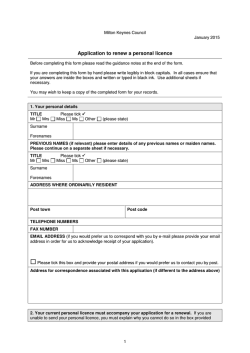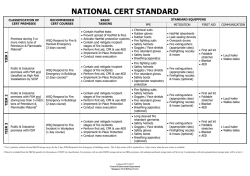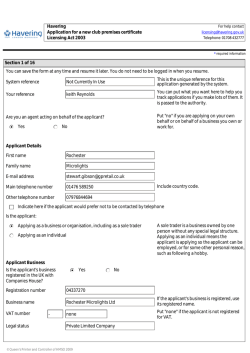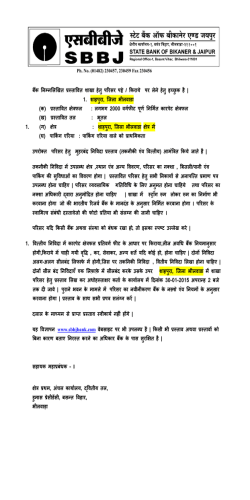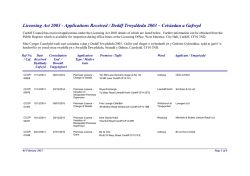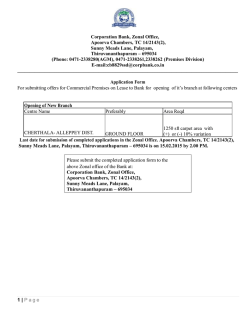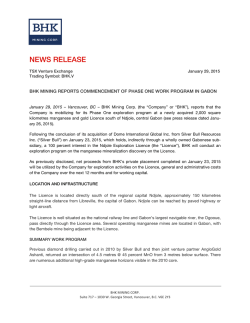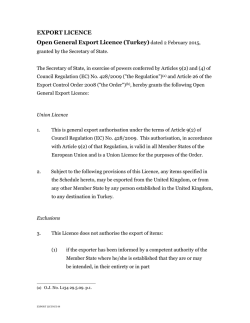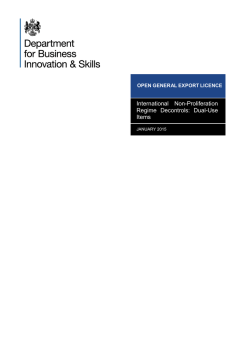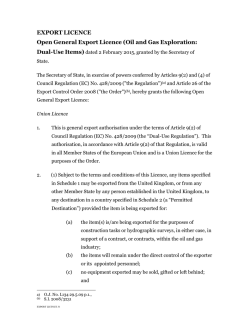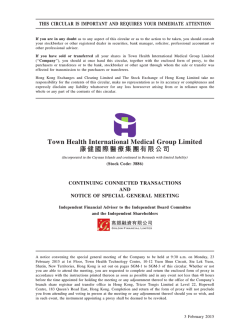
Licensing Hearing - Meetings, agendas, and minutes
Licensing Hearing To: Councillors Boyce, Crisp and McIlveen Date: Thursday, 5 February 2015 Time: 10.00 am Venue: The Auden Room - Ground Floor, West Offices (G047) AGENDA 1. Chair To elect a Member to act as Chair of the meeting. 2. Introductions 3. Declarations of Interest At this point in the meeting, Members are asked to declare: any personal interests not included on the Register of Interests any prejudicial interests or any disclosable pecuniary interests which they may have in respect of business on this agenda. 4. The Determination of an Application by Mr Andrew Elliott to Vary a Premises Licence Section 35(3)(a) in respect of Mansion Nightclub, 53-55 Micklegate, York, YO1 6LJ. (CYC-009397) Democracy Officer: Name: Laura Bootland Contact Details: Telephone – (01904) 552062 Email - [email protected] For more information about any of the following, please contact the Democracy Officer responsible for servicing this meeting: Registering to speak Business of the meeting Any special arrangements Copies of reports and For receiving reports in other formats. Contact details are set out above. Distribution: Members of Licensing Act 2003 Sub-Committee Licensing Officer Legal Services Applicant Representors Press, Library. Page 1 Agenda Item 1 LICENSING ACT 2003 SUB – COMMITTEES PROCEDURE FOR HEARINGS Introduction The procedure outlined below will be followed at all Licensing Hearings. As Licensing Hearings are quasi-judicial the Sub-Committee will, in effect, act like a Court and the rules of natural justice will apply. The Sub-Committee will be guided by legal principles in determining whether evidence is both relevant and fairly admitted. Committee Members have a duty to view all evidence presented before them impartially. Members of the Licensing Sub-Committee have all received relevant training and are used to making decisions of this type. No matter how strong local opinion may be, Committee Members can only make decisions based on relevant licensing issues as set out before the Sub-Committee in determining applications. The hearing will be in public session. However, the Sub-Committee may exclude the public from a hearing if it considers it in the public interest to do so. However, the decision will be made in private. The purpose of the hearing is To enable those with a right to appear to advance their point of view and to test the case of their opponents To assist the Sub-Committee to gather evidence and understand the relevant issues In view of the requirement to hold hearings within specified times, the Licensing Authority will generally be unable to enter into discussions to identify dates convenient to all parties concerned. In exceptional circumstances, the Licensing Authority will consider applications to adjourn hearings to a later date. Representations at Licensing Hearings The Applicant, Ward Councillors, and Representors who have made written submissions will be allowed to speak at the Sub-Committee. At Page 2 any hearing of an application, the Applicant and any Representors shall attend in person wherever possible. Any party to a hearing may be assisted or represented by any person, legally or otherwise. All parties will be given a fair hearing and each party will have the same amount of time in which to address the Sub-Committee. A time limit has been set because of the pressures on the Sub-Committees to hear so many applications in a short period of time. Each party will have 15 minutes to address the Sub-Committee, give any further information, and call any witnesses. If any party considers this time to be insufficient then a request in writing may be made to the Democracy Officer for an extension of time at least 2 working days before the hearing. However, this will not be automatically granted and will be at the discretion of the Sub-Committee. The Sub-Committee may take into account any documentary evidence or other information in support of the application, representations or notice, either before the hearing or, with the consent of all other parties, at the hearing. If any Representors fail to attend the hearing, the Sub-Committee will normally proceed but will consider their written objection and hear and consider any evidence and argument in relation to it put forward by the Applicant. In considering written evidence in the absence of a Representor, appropriate weight will be attached, given that the person cannot be questioned by the Applicant and Members. The Sub-Committee is required to disregard any information given or evidence produced by a party or witness which is not relevant to the application, representations, or notice, and the promotion of the licensing objectives. Duplication should be avoided. Comments must be confined to those points already made, although the parties may extend or expand on their written submissions. The Sub-Committee will have read and familiarised themselves with all the written submissions and the issues prior to the hearing, and therefore do not require the points to be repeated or made at length. The Applicant and Representors cannot raise substantial new information at a hearing which has not been seen previously by the other parties. A Representor may not introduce any new ground or objection not referred to in the written submission. Additional representations which do not amount to an amplification of the original representation may not be made at the hearing. Page 3 Any person behaving in a disruptive manner will be asked to leave the hearing. If this does occur, that person may, before the end of the hearing, submit in writing any information which they would have been entitled to give orally. Procedure prior to the Hearing The Members sitting on the Sub-Committee will meet prior to the hearing to note the matters that are to be presented. They will only be accompanied by the Democracy Officer and Legal Advisor (if present). Attention will only be drawn to the nature of the application and the premises or person to which it relates. The actual application will not be discussed. At any hearing of an application, the Licensing Officer, the Applicant and any Representors or representatives will report to reception and be asked to wait in reception until the democracy officer calls them through to the committee room. Procedure at the Hearing 1. Members of the Sub-Committee will appoint a chair. 2. The Chair introduces the Committee Members and officers [Democracy Officer, Legal Advisor to the committee (if present) and the Licensing Officer], welcomes the Applicant and Representors (or their representatives), and establishes the identity of all who will be taking part. 3. The Chair will explain to the parties the procedure that will be followed at the hearing. 4. The Chair will proceed with the order of business on the agenda. 5. When the agenda item relating to the application is reached, the Chair will invite the Licensing Officer to present the application. 6. The Licensing Officer outlines the application, confirms the application details, introduces the report and gives an update on any recent changes. Page 4 7. The Chair will invite Committee Members, the Applicant and Representors (or representatives) to ask the Licensing Officer questions to clarify any points raised in the report. 8. The Chair will ask the Applicant (or their representative) to present their case. 9. The Applicant (or their representative) will present their case and may call any witnesses to support their case [maximum 15 minutes]. 10. The Chair will invite the Representors (or their representative) in the following order to ask questions of the Applicant (or their representative) and/or witnesses [maximum 5 minutes each party] (i) (ii) (iii) (iv) Police Other Responsible Authorities Ward Councillors Interested Parties 11. The Chair will invite the Committee Members to ask questions of the Applicant (or their representative) and/or witnesses. 12. The Chair will invite the Representors (or their representative) in the following order to state the nature of their interest in the matter, present their case and call any witnesses to support their case [maximum 15 minutes each party] (i) (ii) (iii) (iv) Police Other Responsible Authorities Ward Councillors Interested Parties 13. The Chair will invite the Applicant to ask questions of each Representor (or their representative) and/or their witnesses after each presentation [maximum 5 minutes per Representor]. 14. The Chair will invite the Committee Members to ask questions of each Representor (or their representative) and/or their witnesses after each presentation. Page 5 15. The Chair will invite the Representors (or their representative) in the following order to summarise their case [maximum 5 minutes each party] (i) (ii) (iii) (iv) Police Other Responsible Authorities Ward Councillors Interested Parties 16. The Chair will invite the Applicant (or their representative) to summarise their case [maximum 5 minutes]. 17. The Chair will provide the Sub-Committee with a final opportunity to seek clarification from any of the parties on any points raised, or seek advice from the Licensing Officer on policy, or from the Legal Advisor (if present) on law and jurisdiction. 18. When all the evidence has been heard, the Chair will declare the hearing closed and ask the Licensing Officer, the Applicant and Representors (or their representatives) plus any witnesses present to leave the committee room and wait in reception while the SubCommittee considers the evidence. Procedure after the Hearing 19. If the Sub-Committee wish to seek further clarification on the evidence given, the Democracy Officer will invite all parties back into the committee room. 20. If possible, and for all hearings under:section 35 or 39 which is in respect of an application made at the same time as an application for conversion of an existing licence under paragraph 2 of Schedule 8 (determination of application under section 34 or 37) section 85 which is in respect of an application made at the same time as an application for conversion of an existing club certificate under paragraph 14 of Schedule 8 (determination of application under section 85) section 105(2)(a) (counter notice following police objection to temporary event notice) section 167(5)(a) (review of premises licence following closure order) Page 6 paragraph 4(3)(a) of Schedule 8 (determination of application for conversion of existing licence) paragraph 16(3)(a) of Schedule 8 (determination of application for conversion of existing club certificate) paragraph 26(3)(a) of Schedule 8 (determination of application by holder of a justices’ licence for grant of personal licence) the Sub-Committee will make a decision on conclusion of the hearing and only the Democracy Officer and the Legal Advisor to the Sub-Committee (if present) will remain in the room with the Committee Members. These officers will not comment on the merits of the application, but will be present to provide advice on legal and procedural points and to record the decision. 21. If the decision has been made, all the parties will be invited back into the committee room by the Democracy Officer. The Chair will announce the decision including reasons together with, if appropriate, details of any conditions to be attached to the grant of the licence. This decision will then be communicated in writing to the Applicant and Representors within 3 working days of the hearing. There can be no further questions or statements. 22. For all other hearings not listed above, if the Sub-Committee is unable to make a decision on the day of the hearing, the decision will be made within 5 working days beginning with the day or the last day on which the hearing was held. The Democracy Officer will inform the parties that they are no longer required and the decision will be communicated in writing to the Applicant and Representors within 3 working days of the decision being made. 23. The notification will include information about the rights of appeal against the determination made. Page 7 Licensing Act 2003 Sub Committee Agenda Item 4 5 February 2015 Report of the Director of Communities and Neighbourhoods Section 35(3) (a) Application for the variation of a premise licence for Mansion Nightclub, 53-55 Micklegate, York, YO1 6LJ 1. This report seeks Members determination of an application for the variation of a premise licence, which has been made under the Licensing Act 2003. 2. Application reference number: CYC-009397 3. Name of applicant: Andrew Elliott 4. Type of authorisation applied for: Variation of premises licence. 5. Summary of application: The nature of the application is as follows: 1) To change the layout to the premises. 2) To remove the embedded conditions relating to credit sales and the attachment of PEL (Public Entertainment Licence) conditions. 3) To extend the hours for the sale of alcohol to between 10:00 and 04:30. 4) To extend the opening hours and hours for permitted regulated entertainment to between 10:00 and 05:00. 5) To extend the hours for late night refreshment to 23:00 and 05:00. 6) To permit extensions to these hours on race days. 7) To add existing conditions to the premises licence; Background 6. A copy of the existing premise licence is attached at Annex 1. A copy of the plans showing the existing layout of the premises is attached at Annex 2. 7. A copy of the application to vary the licence is attached at Annex 3. A copy of the plan showing the proposed change to layout of the premises is attached at Annex 4. Page 8 8. The following schedule lists the existing and proposed licensable activities and hours; LICENSABLE ACTIVITIES Films Live Music Recorded Music Performances of dance Activities like music/dance Late Night Refreshment Supply of Alcohol Opening Hours CURRENT HOURS PROPOSED HOURS Monday to Sunday 10:00 – 03:00 As above As above As above Monday to Sunday 10:00 – 05:00 As above As above As above As above As above Monday to Sunday 23:00 – 03:00 Monday to Sunday 10:00 – 02:30 Monday to Sunday 23:00 – 05:00 Monday to Sunday 10:00 – 04:30 Non standard timings From the end of permitted hours on New Year’s Eve until the start of permitted hours on New Year’s Day Monday to Sunday 10:00 – 03:00 Non standard timings From the end of permitted hours on New Year’s Eve until the start of permitted hours on New Year’s Day Monday to Sunday 10:00 – 05:00 Non standard timings From the end of permitted hours on New Year’s Eve until the start of permitted hours on New Year’s Day Non standard timings From the end of permitted hours on New Year’s Eve until the start of permitted hours on New Year’s Day An additional hour on the end of all timings on racedays and on the morning the clocks go forward Page 9 Promotion of Licensing Objectives 9. The applicant proposes the following conditions to be added to those already stipulated on their existing licence: i) There will be no entry / re-entry to the premises (save for persons who have gone to the designated smoking area) after 04:00. ii) A CCTV system will be installed and maintained at the premises. Images will be retained for a minimum period of 28 days and be made available to officers of the responsible authorities on request. iii) The outside smoking area will be monitored by a designated member of staff whose duty it is to ensure that no disturbance is caused by those using the smoking area. iv) The premises will operate a written queuing and dispersal policy to ensure customers leave quietly. That policy will be operated and a copy made available to officers of the responsible authorities on request. Special Policy Consideration 10. This premise falls within an area that has been identified as one where the concentration of a significant number of licensed premises has a considerable impact on the licensing objectives. As part of a series of measures to address the problems of a city centre increasingly blighted by alcohol misuse, this area has been made the subject of a special policy that addresses the impact of the concentration of licensed premises in this particular part of the city centre. The Special Policy was initially approved for this area by full council on 7th January 2011 and an extension to the policy area was approved by full council on 27 March 2014. A copy of the special Policy Statement is attached at Annex 5. A map showing the location of the venue is attached at Annex 6. Consultation 11. Consultation was carried out by the applicant in accordance with s13, and s17 (5) of the Act and Regulation 42, Parts 2 and 4 of the Licensing Act 2003 (Premises Licences and Club Premises Certificates) Regulations 2005, which concern the displaying of a notice on the premises and an advertisement in a local paper giving details of the application and serving a copy of the application on all responsible authorities. The applicant complied with all statutory requirements. Page 10 12. All procedural aspects of this application have been complied with. Summary of Representations made by Responsible Authorities 13. A representation was received from North Yorkshire Police on the grounds that the following licensing objectives would be undermined if the application was to be granted; the prevention of crime and disorder; public safety; prevention of public nuisance. The following is a summary of their representation: 1) The grant of the variation is likely to add to the existing cumulative impact within York’s Cumulative Impact Zone (CIZ) area. 2) A significant number of premises already provide licensable activities within the vicinity of these premises (on licensed / late night refreshment houses). 3) The increased hours of trading will have a significant bearing on the likelihood for crime and disorder. 4) Potential negative impact on the current multi-agency work being conducted under the Safer night-time economy strategy. 5) The removal of all “compliance with PEL conditions” will have a detrimental impact on the crime and disorder licensing objective. 6) Perceived public safety issue as first floor fire exit indicated on plan into neighbouring premises is out of the control of 53-55 Micklegate. 7) Potential crime and disorder issue as designated smoking area mentioned in volunteered conditions is not defined as a specific location on submitted plans. 14. North Yorkshire Police did not propose any additional conditions that could be attached to the licence to address these issues, as they oppose the extension to existing licensable hours. A copy of the representation is attached at Annex 7. 15. A representation was received from the Licensing Authority in its role as a responsible authority on the grounds that the prevention of crime and disorder and prevention of public nuisance licensing objectives would be undermined. This representation was subsequently withdrawn when the applicant agreed to the following two conditions being attached to the premises licence: i. ii. The maximum occupancy of the premises will be 500 persons. All off sales of alcohol shall be made in sealed containers. Page 11 16. A further representation was received from CYC Environmental Protection Unit (EPU), on the grounds that the licensing objective, prevention of public nuisance, would be undermined if the variation application was granted. However this representation was withdrawn when the applicant agreed to the following conditions being attached to the premises licence if granted: i. ii. iii. iv. v. vi. vii. viii. ix. x. Bottle bins will be emptied between 09:00 and 23:00. Notices will be displayed at the Micklegate exit asking customers to leave the premises quietly. During the operation of amplified equipment and regulated entertainment all doors, including fire doors, shall be kept shut when not in use. With the exception to the front door which may remain open during opening hours, providing that the noise emanating does not cause a nuisance to any noise sensitive premises. All windows and doors opening onto the rear car park area of the premises shall be kept closed during regulated entertainment. Except for any door used for access which forms a lobby consisting of a minimum of 2 doors, one at each end of the lobby. These lobby doors shall be kept closed except for ingress and egress and fitted with a self closing device. Notices will be displayed in the car park asking customers to have regard for neighbours by leaving the area quietly. All music shall be played via a noise limiting device to be agreed with City of York Council's Environmental Protection Unit prior to use. Prominent, clear and legible signs shall be displayed in the DJ area to inform DJs that all music is to be played through the noise limiter provided. An alarm system shall be installed and be operational during hours of opening to the public which alerts staff when the rear fire door has been opened. Prominent, clear and legible notices shall be displayed on all fire exits stating that fire exits are for emergency use only. Documented patrols shall be carried out by members of staff at no less than hourly intervals during the hours of opening to the public. The documentation for the patrols shall be made in the course of the patrol or on the completion of each patrol. These checks shall be undertaken outside the building to the front and rear to check for noise from inside the premises and noise from Customer’s outside the venue to ensure compliance with condition 13. The patrol documents shall be kept for a minimum of 3 months and made available to the Licensing Authority or any responsible authority on reasonable request. Page 12 xi. xii. xiii. xiv. Staff training shall be given and documented regarding all matters relating to the licence and its conditions. Records of training shall be kept for 3 years. A direct contact number for the duty manager shall be made available to residents living in the vicinity of the premises on request. No music or amplified sound shall be audible at the boundary of the car park to the rear of the premises. During hours the premises is open to the public, fire doors shall be fitted with non-locking restrictions which prevent their opening except in an emergency. Summary of Representations made by other persons 17. Six relevant representations have been received from persons listed at Annex 8 including a representation from the Micklegate Ward Councillors. A copy of these representations is shown at Annex 9. 18. Members are reminded that representations are only “relevant” if they relate to the likely effect of the grant of the licence on the promotion of at least one of the licensing objectives. Planning Issues 19. There are no planning issues regarding this application. Options 20. By virtue of s18 (4) of the Act, the Committee have the following options available to them in making their decision:21. Option 1: Grant the variation of the licence in the terms applied for. 22. Option 2: Grant the variation of the licence with modified/additional conditions imposed by the licensing committee. 23. Option 3: Grant the variation of the licence to exclude any of the licensable activities to which the application relates and modify/add conditions accordingly. 24. Option 4: Reject the application. 25. Members are reminded that they may only use their discretion to add, remove or amend conditions or activities in relation to matters that are raised by representors and are relevant to the promotion of the licensing objectives. Page 13 Analysis 26. The following could be the result of any decision made this Sub Committee:27. Option 1: This decision could be appealed at Magistrates Court by any of the representors. 28. Option 2: This decision could be appealed at Magistrates Court by the applicant or any of the representors. 29. Option 3: This decision could be appealed at Magistrates Court by the applicant or any of the representors. 30. Option 4: This decision could be appealed at Magistrates Court by the applicant. Council Plan 31. The Licensing Act 2003 has 4 objectives the prevention of crime and disorder, public safety, prevention of public nuisance and the protection of children from harm. 32. The promotion of the licensing objectives will support the Council’s priorities to protect vulnerable people, build strong communities, and protect the environment. Implications 33. Financial - N/A Human Resources (HR) – N/A Equalities – N/A Legal – This decision could be appealed at Magistrates Court by the applicant or any of the representors. Crime and Disorder - The Committee is reminded of their duty under the Crime and Disorder Act 1998 to consider the crime and disorder implications of their decisions and the authority’s Page 14 responsibility to co-operate in the reduction of crime and disorder in the city. Information Technology (IT) – N/A Property – N/A Other – none Risk Management 34. All Members of the Licensing Act 2003 Committee have received full training on the Act and the regulations governing hearings. They are aware that any decision made which is unreasonable or unlawful could be open to challenge resulting in loss of image, reputation and potential financial penalty. 35. The report details the options available to the panel in determining the application and recommends that a decision be reached. There are no risks involved with this recommendation. Recommendations 36. Members determine the application. Reason: To address the representations received as required by the Licensing Act 2003. Page 15 Contact Details Author: Lesley Cooke Licensing Manager Chief Officer Responsible for the report: Steve Waddington Assistant Director– Housing & Public Protection. Tel no: 01904 551515 Report Approved Date 14/01/15 Specialist Implications Officer(s): Head of Legal & Democratic Legal Services Ext: 1004 Wards Affected: Micklegate For further information please contact the author of the report Background Papers: Annex 1 - Copy of existing premises licence Annex 2 - Copy of plans showing existing premises layout Annex 3 - Copy of application form Annex 4 - Copy of plans showing proposed premises layout Annex 5 - Copy of CYC Special Policy Statement Annex 6 - Map of area showing location of premises Annex 7 - Copy of police representation Annex 8 - List of representors Annex 9 - Copies of representations Annex 10 - Mandatory Conditions Annex 11 - Legislation and Policy Considerations This page is intentionally left blank Page 17 ANNEX 1 LICENSING ACT 2003 PREMISES LICENCE Schedule 12 Part A Premises licence number CYC - 009397 Part 1 Premises details Postal address of premises: 53-55 Micklegate Post town: York Post code: YO1 6LJ Telephone number: 01904 620602 Expiry date: This licence has no expiry date. Licensable activities authorised by the licence: Films Live Music Recorded Music Performances of Dance Activities like music/dance Late Night Refreshment Supply of Alcohol Page 18 The times the licence authorises the carrying out of licensable activities: FILMS Indoors Monday 10:00-03:00 Tuesday 10:00-03:00 Wednesday 10:00-03:00 Friday 10:00-03:00 Saturday 10:00-03:00 Sunday 10:00-03:00 Monday 10:00-03:00 Tuesday 10:00-03:00 Wednesday 10:00-03:00 Friday 10:00-03:00 Saturday 10:00-03:00 Sunday 10:00-03:00 Monday 10:00-03:00 Tuesday 10:00-03:00 Wednesday 10:00-03:00 Friday 10:00-03:00 Saturday 10:00-03:00 Sunday 10:00-03:00 Thursday 10:00-03:00 LIVE MUSIC Indoors Thursday 10:00-03:00 RECORDED MUSIC Indoors Thursday 10:00-03:00 PERFORMANCES OF DANCE Indoors Monday 10:00-03:00 Tuesday 10:00-03:00 Wednesday 10:00-03:00 Friday 10:00-03:00 Saturday 10:00-03:00 Sunday 10:00-03:00 Thursday 10:00-03:00 ACTIVITIES LIKE MUSIC/DANCE Indoors Monday 10:00-03:00 Tuesday 10:00-03:00 Wednesday 10:00-03:00 Friday 10:00-03:00 Saturday 10:00-03:00 Sunday 10:00-03:00 Thursday 10:00-03:00 LATE NIGHT REFRESHMENT Indoors Monday 23:00-03:00 Tuesday 23:00-03:00 Wednesday 23:00-03:00 Friday 23:00-03:00 Saturday 23:00-03:00 Sunday 23:00-03:00 Thursday 23:00-03:00 Page 19 SUPPLY OF ALCOHOL Monday 10:00-02:30 Tuesday 10:00-02:30 Wednesday 10:00-02:30 Friday 10:00-02:30 Saturday 10:00-02:30 Sunday 10:00-02:30 Thursday 10:00-02:30 Non Standard Timings for Supply of Alcohol From the end of permitted hours on New Year's Eve until the start of permitted hours on New Year's Day. The Opening Hours of the Premises Monday 10:00-03:00 Tuesday 10:00-03:00 Wednesday 10:00-03:00 Friday 10:00-03:00 Saturday 10:00-03:00 Sunday 10:00-03:00 Thursday 10:00-03:00 Non Standard Timings: From the end of permitted hours on New Year's Eve until the start of permitted hours on New Year's Day. Where the licence authorises supplies of alcohol whether these are on and/or off supplies: On and off the premises Part 2 Name, (registered) address, telephone number and email (where relevant) of holder of premise licence: Name: Mr Andrew Elliott Address: Ella Cottage High Moor Lane Shipton York YO30 1AZ Telephone number: 01347 848772 Email address: [email protected] Page 20 Annex 1 – Mandatory conditions MANDATORY CONDITIONS IN RELATION TO THE SUPPLY OF ALCOHOL (1) In accordance with section 19 of the Licensing Act 2003, where a premises licence authorises the supply of alcohol, the licence must include the following conditions. (2) The first condition is that no supply of alcohol may be made under the premises licence (a) at a time where there is no designated premises supervisor in respect of the premises licence, or (b) at a time when the designated premises supervisor does not hold a personal licence or his personal licence is suspended. (3) The second condition is that every supply of alcohol under the premises licence must be made or authorised by a person who holds a personal licence. (4) - (1) The responsible person shall take all reasonable steps to ensure that staff on relevant premises do not carry out, arrange or participate in any irresponsible promotions in relation to the premises. (4) - (2) In this paragraph, an irresponsible promotion means any one or more of the following activities, or substantially similar activities, carried on for the purpose of encouraging the sale or supply of alcohol for consumption on the premises in a manner which carries a significant risk of leading or contributing to crime and disorder, prejudice to public safety, public nuisance, or harm to children(a) games or other activities which require or encourage, or are designed to require or encourage, individuals to (i) drink a quantity of alcohol within a time limit (other that to drink alcohol sold or supplied on the premises before the cessation of the period in which the responsible person is authorised to sell or supply alcohol), or (ii) drink as much alcohol as possible (whether within a time limit or otherwise); (b) provision of unlimited or unspecified quantities of alcohol free or for a fixed or discounted fee to the public or to a group defined by a particular characteristic (other than any promotion or discount available to an individual in respect of alcohol for consumption at a table meal, as defined in section 159 of the Act); (c) provision of free or discounted alcohol or any other thing as a prize to encourage or reward the purchase and consumption of alcohol over a period of 24 hours or less; (d) provision of free or discounted alcohol in relation to the viewing on the premises of a sporting event, where that provision is dependent on(i) the outcome of a race, competition or other event or process, or (ii) the likelihood of anything occurring or not occurring; (e) selling or supplying alcohol in association with promotional posters or flyers on, or in the vicinity of, the premises which can reasonably be considered to condone, encourage or glamorise anti-social behaviour or to refer to the effects of drunkenness in any favourable manner. (5) The responsible person shall ensure that no alcohol is dispensed directly by one person into the mouth of another (other than where that other person is unable to drink without assistance by reason of a disability). (6) The responsible person shall ensure that free tap water is provided on request to customers where it is reasonably available. (7) - (1) The premise licence holder or club premise certificate holder shall ensure that an age verification policy applies to the premises in relation to the sale or supply of alcohol. Page 21 (7) - (2) The policy must require individuals who appear to the responsible person to be under 18 years of age (or such older age as may be specified in the policy) to produce on request, before being served alcohol, identification bearing their photograph, date of birth and a holographic mark. (8) The responsible person shall ensure that (a) where any of the following alcoholic drinks is sold or supplied for consumption on the premises (other than alcoholic drinks sold or supplied having been made up in advance ready for sale or supply in a securely closed container) it is available to customers in the following measures (i) beer or cider: half pint; (ii) gin, rum, vodka or whisky: 25 ml or 35 ml; and (iii) still wine in a glass: 125 ml; and (b) customers are made aware of the availability of these measures. MANDATORY CONDITION: EXHIBITION OF FILMS (1) In accordance with section 20 of the Licensing Act 2003, where a premises licence authorises the exhibition of films, the licence must include a condition requiring the admission of children to the exhibition of any film to be restricted in accordance with this section. (2) Where the film classification body is specified in the licence, unless subsection (3)(b) applies, admission of children must be restricted in accordance with any recommendation made by that body. (3) Where (a) the film classification body is not specified in the licence, or (b) the relevant licensing authority has notified the holder of the licence that this subsection applies to the film in question, admission of children must be restricted in accordance with any recommendation made by that licensing authority. (4) In this section - 'children' means persons aged under 18; and 'film classification body' means the person or persons designated as the authority under section 4 of the Video Recordings Act 1984 (c.39) (authority to determine suitability of video works for classification). MANDATORY CONDITION: DOOR SUPERVISION (1) In accordance with section 21 of the Licensing Act 2003 (as amended by section 25 Violent Crime Reduction Act 2006), where a premises licence includes a condition that at specified times one or more individuals must be at the premises to carry out a security activity, the licence must include a condition that each such individual must (a) be authorised to carry out that activity by a licence granted under the Private Security Industry Act 2001; or (b) be entitled to carry out that activity by virtue of section 4 of that Act. (2) But nothing in subsection (1) requires such a condition to be imposed (a) in respect of premises within paragraph 8(3)(a) of Schedule 2 to the Private Security Industry Act 2001 (c.12) (premises with premises licences authorising plays or films), or (b) in respect of premises in relation to (i) any occasion mentioned in paragraph 8(3)(b) or (c) of that Schedule (premises being used exclusively by club with club premises certificate, under a temporary event notice authorising plays or films or under a gaming licence, or (ii) any occasion within paragraph 8(3)(d) of that Schedule (occasions prescribed by regulations under that Act). Page 22 (3) For the purposes of this section (a) "security activity" means an activity to which paragraph 2(1)(a) of that Schedule applies, and which is licensable conduct for the purposes of that Act (see section 3(2) of that Act), and (b) paragraph 8(5) of that Schedule (interpretation of references to an occasion) applies as it applies in relation to paragraph 8 of that Schedule. Embedded Restrictions STANDARD PRE-EXISTING CONDITIONS APPLICABLE TO ON LICENCE WITH NO CHILDREN'S CERTIFICATE 1) The restrictions to permitted hours do not prohibit: a) the sale or supply of alcohol to, or consumption of alcohol by, any person residing at the licensed premises b) the supply of alcohol for consumption on the premises to any private friends of a person residing there who are bona fide entertained by him at his own expense, or the consumption of alcohol by persons so supplied c) the supply of alcohol for consumption on the premises to persons employed there for the purposes of the business carried on by the holder of the licence, or the consumption of liquor so supplied, if the liquor is supplied at the expense of their employer or of the person carrying on or in charge of the business on the premises. Credit Sales 2. Intoxicating liquor shall not be sold or supplied for consumption on the premises unless it is paid for before or at the time when it is sold or supplied. This condition, however, shall not apply: a) If the liquor is sold or supplied for consumption at a meal supplied at the same time, is consumed with the meal and is paid for together with the meal, or b) If the liquor is sold or supplied for consumption by a person residing in the premises or his guests and is paid for together with his accommodation, or c) If the sale or supply of intoxicating liquor is to any canteen in which the sale or supply of alcohol is carried out under the authority of the Secretary of State or to an authorised mess of members of Her Majesty's naval, military or air forces. Private Entertainment As the provisions of the Private Places of Entertainment (Licensing) Act 1967 was previously adopted and applied throughout the City of York Council area, private entertainment for gain may be provided throughout the premises without limitation by virtue of the previous Justices Licence. Recorded Music Recorded music may be played throughout the premises without limitation in line with previous provisions as set out in Section 182 of the Licensing Act 1964. For Regulated Entertainment consisting of Music and Dancing a) The licence holder shall attach a copy of the City Council's Rules for the Management of Places of Public Entertainment to the valid licence. This document shall form part of the licence. Page 23 b) The licence holder shall ensure prompt compliance with any written report received from the City Council. c) The licence holder shall ensure prompt compliance with any written report received from North Yorkshire Fire and Rescue Service. d) The maximum occupancy of the licensed premises shall not exceed the following numbers at any time: Total occupancy - 500 persons Maximum occupancy of the basement - 250 persons NB: No part of the premises other than the area(s) specified above shall be used for purposes permitted by this licence. Annex 2 – Conditions consistent with the operating schedule Licensing Objectives Prevention of Crime & Disorder 1. SIA registered door staff will be employed at the premises. 2. CCTV cameras cover both the interior and the exits to the club. 3. The premise will participate in any radio link scheme linking a majority of local licensed premises to the police. Public Safety 4. Complies with current local authority and fire service safety regulations with regard to emergency lighting, fire alarms and electrical installation checks etc. Public Nuisance 5. Bottle bins will be emptied between 09:00 hours and 23.30 hours. 6. Notices will be displayed at the Micklegate exit asking customers to leave the premises quietly. 7. During the operation of amplified equipment and regulated entertainment all doors, including fire door’s, shall be kept shut when not in use. With the exception to the front door which may remain open during opening hours, providing that the noise emanating does not cause a nuisance to any noise sensitive premises. 8. Notices will be displayed in the car park asking customers to have regard for neighbours by leaving the area quietly. Protection of Children from Harm 9. No under 18s are allowed on the premises unless at an arranged under 18 event run in conjunction with the local authority and police. 10. Proof of age scheme is in operation. Page 24 Annex 3 – Conditions attached after a hearing by the licensing authority Review 1. All music in the basement area shall be via the dBX Drive Rack PA noise limiter or similar noise limiter to be agreed with City of York Council's Environmental Protection Unit prior to use. 2. Prominent, clear and legible signs shall be displayed in the DJ area to inform DJs that all music is to be played through the noise limiter provided. 3. An alarm system shall be installed and be operational during hours of opening to the public which alerts staff when the rear fire door has been opened. 4. Prominent, clear and legible notices shall be displayed on all fire exits stating that fire exits are for emergency use only. 5. Documented patrols shall be carried out by members of staff at no less than hourly intervals during the hours of opening to the public. These checks shall be undertaken outside the building to the front and rear to check for noise from inside the premises and noise from Customer’s outside the venue to ensure compliance with Condition 9. 6. Staff training shall be given and documented regarding all matters relating to the licence and its conditions. Records of training shall be kept for 3 years. 7. All windows and doors opening onto the rear car park area of the premises shall be kept closed during regulated entertainment. 8. A direct contact number for the duty manager shall be made available to residents living in the vicinity of the premises on request. 9. No music or amplified sound shall be audible at the boundary of the car park to the rear of the premises. 10. During hours the premises is open to the public, fire doors shall be fitted with non-locking restrictions which prevent their opening except in an emergency. Annex 4 – Approved Plan Plan Number 009397 – 16/11/10 For and on behalf of The Director of Communities & Neighbourhoods Date: 16/08/2005 01/11/2012 (DPS Variation) Licensing Services 9 St Leonard’s Place York Y01 7ET Phone: 01904 552512 Fax: 01904 551590 Email: [email protected] Website: www.york.gov.uk/licensing Page 25 Page 26 Page 27 This page is intentionally left blank Page 29 Page 30 Page 31 Page 32 Page 33 Page 34 Page 35 Page 36 Page 37 Page 38 Page 39 Page 40 Page 41 Page 42 Page 43 Page 44 Page 45 ANNEX 5 CITY CENTRE SPECIAL POLICY STATEMENT This Special Policy was initially approved by the City of York on 12 April 2005, revised and updated and approved by full Council on 27th March 2014. and shall have effect until 2019 unless otherwise reviewed by the Council. This Special Policy is a supplement to the Council's Statement of Licensing Policy and must be read in conjunction with that document. This area has been identified as requiring additional licensing controls to promote the licensing objectives due to the cumulative effect of the concentration of late night drink led, refreshment and entertainment premises on crime, disorder and/or public nuisance affecting residents, visitors and other businesses. A statistical, evidence based report was submitted by North Yorkshire Police to substantiate this statement and was considered by the City of York Council in approving this policy. Consultation on the Special Policy was carried out in accordance with Section 5(3) of the Licensing Act 2003. Effects of the Special Policy 1. This policy relates to applications for the grant and/or variation of premises licences or club premises certificates or the issue of provisional statements. 2. Each application will be considered on its own merits. 3. Where no representations are received any application will be granted in terms consistent with the operating schedule. 4. Applications for the grant of a new premises licence or club premises certificate or provisional statement: Where relevant representations are received there will be a presumption against the grant of such a licence or certificate unless the applicant can rebut the presumption that the granting of such a licence or certificate would undermine the licensing objectives. 5. Application for the variation of a premises licence or club premises certificate due to a change of style of operation: Page 46 Any application for the variation of style of operation which is subject to relevant representations will be considered on its own merits having regard to the promotion of the licensing objectives. 6. Application for the variation of a premises licence or club premises certificate resulting in an extension of the premises and increased capacity: There will be a presumption to refuse such applications, where relevant representations are received and where the increase in capacity would undermine the licensing objectives unless the applicant can rebut the presumption that the granting of such a variation would undermine the licensing objectives. 7. Application to vary the hours of operation attached to a premises licence or club premises certificate: All applications that seek to extend the licensed hours will be considered on an individual basis. No different policy will apply in this area as opposed to the rest of the city. Page 47 This page is intentionally left blank Page 49 Page 50 Page 51 Page 52 Page 53 Page 54 Page 55 Page 56 Page 57 Page 58 Page 59 Page 60 Page 61 Page 62 Page 63 ANNEX 8 List of Representors Ref Name No Address 1. Cllr Julie Gunnell Micklegate Cllr Dave Merrett Ward Cllr Sandy Fraser Councillors Representative Body (YES/NO) Representatives of Micklegate Ward Relevant licensing objective Crime & Disorder Public Nuisance 2. Mrs M Chalmers 73-75 Micklegate York YO1 6LJ No Crime & Disorder Public Nuisance 3, Dr D Chalmers 73-75 Micklegate York YO1 6LJ No Public Nuisance 4. Mrs L Alltree 65 Micklegate York YO1 6LJ No Crime & Disorder Public Nuisance 5. Mr D Alltree 65 Micklegate York YO1 6LJ No Crime & Disorder Public Nuisance 6. Dr & Mrs J Jacques Garforth House 54 Micklegate York YO1 6LF No Crime & Disorder Public Nuisance This page is intentionally left blank Page 65 Page 66 Page 67 Page 68 Page 69 Page 70 Page 71 Page 72 Page 73 Page 74 Page 75 This page is intentionally left blank Page 77 ANNEX 10 MANDATORY & PROHIBITED CONDITIONS – PREMISES LICENCE LICENSING ACT 2003 MANDATORY CONDITIONS WHERE LICENCE AUTHORISES SUPPLY OF ALCOHOL 1. In accordance with section 19 of the Licensing Act 2003, where a premises licence authorises the supply of alcohol, the licence must include the following conditions. 2. The first condition is that no supply of alcohol may be made under the premises licence (a) at a time where there is no designated premises supervisor in respect of the premises licence, or (b) at a time when the designated premises supervisor does not hold a personal licence or his personal licence is suspended. 3. The second condition is that every supply of alcohol under the premises licence must be made or authorised by a person who holds a personal licence. 4. (1) The responsible person must ensure that staff on relevant premises do not carry out, arrange or participate in any irresponsible promotions in relation to the premises. (2) In this paragraph, an irresponsible promotion means any one or more of the following activities, or substantially similar activities, carried on for the purpose of encouraging the sale or supply of alcohol for consumption on the premises – (a) games or other activities which require or encourage, or are designed to require or encourage individuals to – (i) drink a quantity of alcohol within a time limit (other than to drink alcohol sold or supplied on the premises before the cessation of the period in which the responsible person is authorised to sell or supply alcohol), or (ii) drink as much alcohol as possible (whether within a time limit or otherwise); (b) provision of unlimited or unspecified quantities of alcohol free or for a fixed or discounted fee to the public or to a group defined by a particular characteristic in a manner which carries a significant risk of undermining a licensing objective; (c) provision of free or discounted alcohol or any other thing as a prize to encourage or reward the purchase and consumption of alcohol over a period of 24 hours or less in a manner which carries a significant risk of undermining a licensing objective; (d) selling or supplying alcohol in association with promotional posters or flyers on, or in the vicinity of, the premises which can reasonably be Page 78 considered to condone, encourage or glamorise anti-social behaviour or to refer to the effects of drunkenness in any favourable manner; (e) dispensing alcohol directly by one person into the mouth of another (other than where that other person is unable to drink without assistance by reason of disability). 5. The responsible person must ensure that free potable water is provided on request to customers where it is reasonably available. 6. (1) The premises licence holder or club premises certificate holder must ensure that an age verification policy is adopted in respect of the premises in relation to the sale or supply of alcohol. (2) The designated premises supervisor in relation to the premises licence must ensure that the supply of alcohol at the premises is carried on in accordance with the age verification policy. (3) The policy must require individuals who appear to the responsible person to be under 18 years of age (or such older age as may be specified in the policy) to produce on request, before being served alcohol, identification bearing their photograph, date of birth and either – (a) a holographic mark, or (b) an ultraviolet feature. 7. The responsible person must ensure that – (a) where any of the following alcoholic drinks is sold or supplied for consumption on the premises (other than alcoholic drinks sold or supplied having been made up in advance ready for sale or supply in a securely closed container) it is available to customers in the following measures – (i) beer or cider: ½ pint; (ii) gin, rum, vodka or whisky: 25ml or 35ml; and (iii) still wine in a glass: 125ml; (b) these measures are displayed in a menu, price list or other printed material which is available to customers on the premises; and (c) where a customer does not in relation to a sale of alcohol specify the quantity of alcohol to be sold, the customer is made aware that these measures are available. MANDATORY CONDITION: ALCOHOL PRICING 1. A relevant person shall ensure that no alcohol is sold or supplied for consumption on or off the premises for a price which is less than the permitted price. 2. For the purposes of the condition set out in paragraph 1 – (a) “duty” is to be construed in accordance with the Alcoholic Liquor Duties Act 1979(6); (b) “permitted price” is the price found by applying the formula – P = D + (D x V) where – Page 79 (i) P is the permitted price, (ii) D is the rate of duty chargeable in relation to the alcohol as if the duty were charged on the date of the sale or supply of the alcohol, and (iii) V is the rate of value added tax chargeable in relation to the alcohol as if the value added tax were charged on the date of the sale or supply of the alcohol; (c) “relevant person” means, in relation to premises in respect of which there is in force a premises licence – (i) the holder of the premises licence, (ii) the designated premises supervisor (if any) in respect of such a licence, or (iii) the personal licence holder who makes or authorises a supply of alcohol under such a licence; (d) “relevant person” means, in relation to premises in respect of which there is in force a club premises certificate, any member or officer of the club present on the premises in a capacity which enables the member or officer to prevent the supply in question; and (e) “value added tax” means value added tax charged in accordance with the Value Added Tax Act 1994(7). 3. Where the permitted price given by Paragraph (b) of paragraph 2 would (apart from this paragraph) not be a whole number of pennies, the price given by that sub-paragraph shall be taken to be the price actually given by that sub-paragraph rounded up to the nearest penny. 4. (1) Sub-paragraph (2) applies where the permitted price given by Paragraph (b) of paragraph 2 on a day (“the first day”) would be different from the permitted price on the next day (“the second day”) as a result of a change to the rate of duty or value added tax. (2) The permitted price which would apply on the first day applies to sales or supplies of alcohol which take place before the expiry of the period of 14 days beginning on the second day. MANDATORY CONDITION: DOOR SUPERVISION 1. In accordance with section 21 of the Licensing Act 2003 (as amended by section 25 Violent Crime Reduction Act 2006), where a premises licence includes a condition that at specified times one or more individuals must be at the premises to carry out a security activity, the licence must include a condition that each such individual must (a) be authorised to carry out that activity by a licence granted under the Private Security Industry Act 2001; or (b) be entitled to carry out that activity by virtue of section 4 of that Act. Page 80 2. But nothing in subsection (1) requires such a condition to be imposed (a) in respect of premises within paragraph 8(3)(a) of Schedule 2 to the Private Security Industry Act 2001 (c.12) (premises with premises licences authorising plays or films), or (b) in respect of premises in relation to (i) any occasion mentioned in paragraph 8(3)(b) or (c) of that Schedule (premises being used exclusively by club with club premises certificate, under a temporary event notice authorising plays or films or under a gaming licence, or (ii) any occasion within paragraph 8(3)(d) of that Schedule (occasions prescribed by regulations under that Act). 3. For the purposes of this section (a) "security activity" means an activity to which paragraph 2(1)(a) of that Schedule applies, and which is licensable conduct for the purposes of that Act (see section 3(2) of that Act), and (b) paragraph 8(5) of that Schedule (interpretation of references to an occasion) applies as it applies in relation to paragraph 8 of that Schedule. MANDATORY CONDITION: EXHIBITION OF FILMS 1. In accordance with section 20 of the Licensing Act 2003, where a premises licence authorises the exhibition of films, the licence must include a condition requiring the admission of children to the exhibition of any film to be restricted in accordance with this section. 2. Where the film classification body is specified in the licence, unless subsection (3)(b) applies, admission of children must be restricted in accordance with any recommendation made by that body. 3. Where (a) the film classification body is not specified in the licence, or (b) the relevant licensing authority has notified the holder of the licence that this subsection applies to the film in question, admission of children must be restricted in accordance with any recommendation made by that licensing authority. 4. In this section - 'children' means persons aged under 18; and 'film classification body' means the person or persons designated as the authority under section 4 of the Video Recordings Act 1984 (c.39) (authority to determine suitability of video works for classification). Page 81 ANNEX 11 Legislation and Policy Considerations 1. The following provisions of The Licensing Act 2003 apply to this application: S4 general duties of licensing authorities; s17 application for premises licence; s18 determination of application for premises licence; s23 grant or rejection of application; ss19, 20 and 21 mandatory conditions; The Licensing Act (Mandatory Licensing Conditions) Order 2010; and The Licensing Act 2003 (Mandatory Conditions) Order 2014. 2. The following provisions of The Licensing Act 2003 (Premises Licences and Club Premises Certificates) Regulations 2005 apply to this application: Regulation 42, Part 2 (Premises licences) and Part 4 (General) relating to applications, notices and representations and advertisement of applications 3. The following provisions of the Secretary of State’s guidance apply to this application: Section 2 The Licensing Objectives; Section 9 Determining applications; Section 10 Conditions attached to premises licences and club certificates; and Section 13 Statements of licensing policy. 4. The following paragraphs of the licensing authority’s statement of licensing policy apply to this application: 5.0 Applications for Premises Licences, Club Premises Certificates and Variations; 6.0 Guidelines for Applicants; 7.0 Saturation and Cumulative Impact and 8.0 Licensing Hours. 5. The Committee is reminded of their duty under the Crime and Disorder Act 1998 to consider the crime and disorder implications of their decisions and the authority’s responsibility to co-operate in the reduction of crime and disorder in the city. 6. The Committee is reminded that the Human Rights Act 1998 guarantees the right to a fair hearing for all parties in the determination of their civil rights. The Act also provides for the protection of property, which may include licences in existence, and the protection of private and family life. Amended 15/01/15 This page is intentionally left blank
© Copyright 2026
